
I probably would have never encountered Ocean Vuong had it not been for James Ellroy. Not in the way you think, though. Ellroy is the furthest one can place from Vuong when it comes to writing style or genre. But it was while attending an Ellroy signing one Saturday at Skylight books that the MC mentioned it may be prudent to buy a copy of writer Ocean Vuong’s book in advance, because it looked like the event would have to be capped.
If there is a single thing one picks up on in independent bookstores, much like in libraries, is that if a recommendation comes from a staff member or from a librarian, it’s best to not reason why, but jump right in. I bought a copy of “On Earth We are Briefly Gorgeous”, spent the weekend reading it, and then came back on Tuesday to listen to Vuong reading from and talking about the book, his first published novel.
It was, believe it or not, a very emotional experience. The crowd was packed, very diverse, the book obviously had a lot of fans even before its official release. I stood in the back of the store, barely able to see Vuong as he whisper-sang words from the book and from his heart. There were people crying during the question-and-answer session.
I don’t want to write about the book, or about Vuong and his life and work, since other people have already done it way better than I ever could have. What I do want to mention is that very obvious sentence. You must read this book. Because it is, true to the writer’s name, filled with joy and mystery and heartbreak and pulls you into its depths with a fierce, unrelenting tug, from the very first page. I have been reading a lot of immigrant fiction lately, tales of travelers to the shores of this country of contradictions. “On Earth We are Briefly Gorgeous” establishes itself as one of the best books about belonging and unbelonging that I have read in recent times.
Migration can be triggered by the angle of sunlight, indicating a change in season, temperature, plant life, and food supply. Female monarchs lay eggs along the route. Every history has more than one thread, each thread a story of division. The journey takes four thousand eight hundred and thirty miles, more than the length of this country. The monarchs that fly south will not make it back north. Each departure, then, is final. Only their children return; only the future revisits the past. What is a country but a borderless sentence, a life?
I won’t stay here long, we might say. I’ll get a real job soon. But more often than not, sometimes within months, even weeks, we will walk back into the shop, heads lowered, our manicure drills inside paper bags tucked under our arms, and ask for our jobs back. And often the owner, out of pity or understanding or both, will simply nod at an empty desk—for there is always an empty desk. Because no one stays long enough and someone is always just-gone. Because there are no salaries, health care, or contracts, the body being the only material to work with and work from. Having nothing, it becomes its own contract, a testimony of presence. We will do this for decades—until our lungs can no longer breathe without swelling, our livers hardening with chemicals—our joints brittle and inflamed from arthritis—stringing together a kind of life. A new immigrant, within two years, will come to know that the salon is, in the end, a place where dreams become the calcified knowledge of what it means to be awake in American bones—with or without citizenship—aching, toxic, and underpaid.
The weight of the average placenta is roughly one and a half pounds. A disposable organ where nutrients, hormones, and waste are passed between mother and fetus. In this way, the placenta is a kind of language—perhaps our first one, our true mother tongue.
One of the most powerful paragraphs of the book involves the presence of metaphors for conflict and violence in discussing art, and Vuong commented on the same during his question-and-answer session:
You killed that poem, we say. You’re a killer. You came in to that novel guns blazing. I am hammering this paragraph, I am banging them out, we say. I owned that workshop. I shut it down. I crushed them. We smashed the competition. I’m wrestling with the muse. The state, where people live, is a battleground state. The audience a target audience. “Good for you, man,” a man once said to me at a party, “you’re making a killing with poetry. You’re knockin’ ’em dead.”
So yeah, read it.
Also, if you are ever in Los Angeles, make sure to look at the Skylight Books events page beforehand, and try to visit one of their signings. The bookshop is in a beautiful LA neighborhood called Los Feliz, and you will feel like you have been there before and walked the streets. You won’t be wrong, because it is a favorite shooting location for TV shows and films alike; two I remember off the top of my head are Ruby Sparks and Atypical, and I am sure there are many more. The bookstore is named for its naturally-lit interior, and there is a tree in the center of shop that makes it even more spectacular.

Oh, and before I forget, James Ellroy’s signing was a hoot. He’s an incredible…character, someone who plays a version of himself in a crowd. Foul-mouthed, rambunctious, funny, and very very kind in person. A reread of the LA Quartet is on the backlog. Watch this space.
